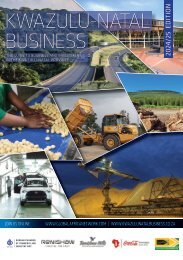South African Business 2024
Welcome to the 12th edition of the South African Business journal. First published in 2011, the publication has established itself as the premier business and investment guide to South Africa, supported by an e-book edition at www.southafricanbusiness.co.za. A special feature in this journal focusses on the relationship between tertiary education, training and the jobs market. The youth unemployment rate is referenced in a discussion of the various measures that are being taken in the public and private sectors to help prepare young people for work, or to encourage them to start businesses. The role of the country’s Sector Education and Training Authorities (SETAs) is highlighted. Regular pages cover all the main economic sectors of the South African economy. This includes tracking the rapidly evolving renewable energy landscape and reporting on the progress of exploration and discoveries of oil and gas off the coast and on land. Landmarks such as BMW’s 50-year celebration of making cars in South Africa are noted and a snapshot of each of the country’s provinces is provided. South African Business is complemented by nine regional publications covering the business and investment environment in each of South Africa’s provinces. The e-book editions can be viewed online at www.globalafricanetwork.com and www.southafricanbusiness.co.za. These unique titles are supported by monthly business e-newsletters. The Journal of African Business joined the Global African Network stable of publications as an annual in 2020 and is now published quarterly.
Welcome to the 12th edition of the South African Business journal. First published in 2011, the publication has established itself as the premier business and investment guide to South Africa, supported by an e-book edition at www.southafricanbusiness.co.za.
A special feature in this journal focusses on the relationship between tertiary education, training and the jobs market. The youth unemployment rate is referenced in a discussion of the various measures that are being taken in the public and private sectors to help prepare young people for work, or to encourage them to start businesses. The role of the country’s Sector Education and Training Authorities (SETAs) is highlighted.
Regular pages cover all the main economic sectors of the South African economy. This includes tracking the rapidly evolving renewable energy landscape and reporting on the progress of exploration and discoveries of oil and gas off the coast and on land. Landmarks such as BMW’s 50-year celebration of making cars in South Africa are noted and a snapshot of each of the country’s provinces is provided.
South African Business is complemented by nine regional publications covering the business and investment environment in each of South Africa’s provinces. The e-book editions can be viewed online at www.globalafricanetwork.com and www.southafricanbusiness.co.za. These unique titles are supported by monthly business e-newsletters. The Journal of African Business joined the Global African Network stable of publications as an annual in 2020 and is now published quarterly.
You also want an ePaper? Increase the reach of your titles
YUMPU automatically turns print PDFs into web optimized ePapers that Google loves.
OVERVIEW<br />
Africa (WWF-SA) and Peace Parks Foundation<br />
initiative. The college is located near the Orpen<br />
Gate on the edge of the Kruger National Park.<br />
Universities<br />
There are three types of public universities<br />
in <strong>South</strong> Africa: traditional universities,<br />
which are academic in focus and award<br />
degrees; universities of technology, which<br />
have a vocational emphasis and can award<br />
diplomas and certificates; and comprehensive<br />
universities which offer a combination of both<br />
types of qualification and can confer degrees<br />
and diplomas.<br />
The addition of two universities in the<br />
provinces of Mpumalanga and the Northern<br />
Cape means that every <strong>South</strong> <strong>African</strong> province<br />
now has a university.<br />
The official launch of the University of<br />
Mpumalanga was in October 2013, with the first<br />
cohort of 169 students registered in just three<br />
programmes in 2014. By <strong>2024</strong>, the plan is to offer<br />
approximately 70 qualifications to over 8 000<br />
students. That is the year in which the university’s<br />
first doctoral graduates will be capped.<br />
Research relevant to the needs of the<br />
province can now be done at local level.<br />
With Sol Plaatje University celebrating its 10th<br />
anniversary in 2023, the chances of indigenous<br />
young people being able to study on its campus<br />
have been boosted by large donations from two<br />
Anglo American subsidiaries.<br />
Kumba Iron Ore and De Beers Group are<br />
among the biggest mining companies active in<br />
ONLINE RESOURCES<br />
Centres of Specialisation: www.dhet.gov.za<br />
National Department of Science and Innovation:<br />
www.dst.gov.za<br />
Sol Plaatje University: www.spu.ac.za<br />
TVET colleges: www.tvetcolleges.co.za<br />
University of Mpumalanga: www.ump.ac.za<br />
A team of students from ORBIT TVET College<br />
competed successfully in an international AI<br />
competition run by Intel.<br />
the Northern Cape. Their donations of R20-million<br />
and R5-million towards the university’s Lesedi La<br />
Afrika Fund will support scholarships and social<br />
impact projects. The fund has set a target of R100-<br />
million over the next three years.<br />
SPU has seen major growth in its enrolment<br />
figures and staff recruitment in recent years,<br />
with 60% of its academic staff having PhDs. As<br />
part of its sustainable growth, the institution<br />
is committed to community engagement and<br />
scholarly activity.<br />
The first intake of students at the Kimberley<br />
campus of Sol Plaatje University in 2014<br />
was 124. For the 2023 academic year a total<br />
of 28 454 applications (undergraduate and<br />
postgraduate) were received by SPU. This is<br />
an increase of just under 9 000 against the<br />
applications received for 2022.<br />
Another milestone was reached in the<br />
university’s young history when the Risk and<br />
Vulnerability Science Centre (RVSC) celebrated<br />
its first birthday, on 9 September 2022. As the<br />
Northern Cape is water-scarce, the unit’s location<br />
is highly relevant. RVSC is a programme of the<br />
Department of Science and Innovation under<br />
the Global Change Research Plan for <strong>South</strong><br />
Africa – funded through the National Research<br />
Foundation’s Global Change programme.<br />
Most of <strong>South</strong> Africa’s universities have<br />
business schools attached to them, offering<br />
MBAs, management diplomas and a variety of<br />
short courses. ■<br />
SOUTH AFRICAN BUSINESS <strong>2024</strong><br />
58


















